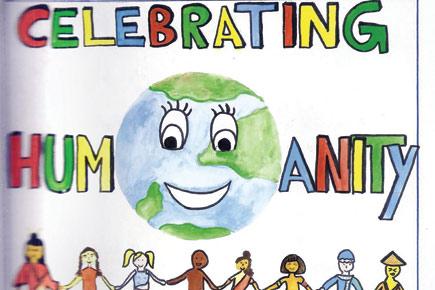My daughter flew out of Paris two hours before bullets bloodied the city of love. That fateful Friday marked the end of her month of backpacking through Europe with a pair of friends

 My daughter flew out of Paris two hours before bullets bloodied the city of love. That fateful Friday marked the end of her month of backpacking through Europe with a pair of friends.
My daughter flew out of Paris two hours before bullets bloodied the city of love. That fateful Friday marked the end of her month of backpacking through Europe with a pair of friends.
Till I was actually able to hug her when she landed the next morning, I was at first gripped by waves of near nausea. Then, in the beautiful way life has of turning you from the inside out, I sensed a stronger surge: overriding relief and gratitude that my 19-year-old was safe. Hundreds, thousands, of less lucky mothers are left mourning there... and in Beirut just days before... and in other lands daily.
ADVERTISEMENT

A child’s drawing from the book I Have A Dream, published after the 26/11 terror attacks
Paris or Peshawar, Mumbai or Mali, toddlers to teenagers don’t escape the politics of hate. Children across countries are sucked faster and further into a violent vortex. We can’t protect them from the relentless media feed of disturbing details and gory images. Today’s habitually wired generation is vulnerable to visuals of insane terrorism. Flooded with totally traumatising footage of random riots and shootings, how kids crave help to process their thoughts, fears and confusion. Denied discussion, they could retreat anguished and afraid, silently scarred by the bewildering barrage of misinformation pounding them.
The very young naturally find it hardest to deal with examples of extremism. Yet, talking about it can broker some momentary solace. Earlier this year, the morning after the Charlie Hebdo gunning in the French capital, a shaken friend called me. She’d just returned from the bazaar having overheard a conversation between her fruit vendor and his son:
"Papa, they say the men who were killed worked for a cartoon magazine?”
“Stop looking at those pictures, give me back that paper.”
“Cartoons make everyone happy. Why would anyone shoot funny men?”
“Ah because people get angry when they feel you are laughing at them.”
“My teacher told us laughter brings friends together. This is the opposite of that!”
“Beta, we’ll talk soon about it, now here’s our next customer...”
With simple wisdom a father had bought his boy a little time and distance from the episode. Skewed logic apart, the chat must surely have brought relief for a bit.
Family counsellor Gouri Dange suggests parents stream internal filters to steer clear of the typicality trap. “Instead of blanket bans (‘Don’t speak badly of Muslims’) or abstract remarks (‘Africans are wonderful people)’, get kids to actively meet people of different ethnicity,” she says. “It’s reassuring to put a more direct face to the ‘them’ in the ‘us’ and ‘them’ of prejudice.”
Ratan Tata observes in his foreword to I Have a Dream, a collection of writings and drawings after the 26/11 serial killings in Mumbai: “Children display unbelievable empathy, courage and imagination when confronted with extreme emotional disturbance.” Of course, a few express avenging anger (‘Wait till I grow up and kill those terrorists’), but this response is outweighed by responses ranging from ‘You cannot clap with one hand’, to ‘No man is completely bad’, to ‘It is us against the problem, not us against each other.’
It takes a troubled young soul to make an adult think twice. On watching Blood Diamond, my kids were stunned by the searing brutality of Sierra Leone’s civil war funded by “conflict diamonds”. Standing ashen-faced before me, brother and sister begged, “Don’t see the movie, mum. You’ll never wear jewellery again.” My husband and I were dressing for a wedding that evening. Later, we did all talk about the tragic complexities dogging Africa. Right then, though, was validation time. I figured it best to don my simplest strand of pearls.
As always, the past is ultimately inspiring. If wars are triggered in the minds of men, the same minds are equally equipped to make peace. What seldom fails to calm are accounts of shared history where violence has proved everyone a loser and peace emerged a common concern. The lessons learnt from warrior-turned-benevolent-emperor Ashoka’s rock carved edicts are a good place to start. His decree both preached and practised - that tolerance is the only eternal law and pacifism shapes a better world - appeals to any child. It did to my son, seven years old when I read him this heroic story. “Wow,” he’d gasped. “You should have named me Ashok.”
Write in to Meher at mehermarfatia@gmail.com
 Subscribe today by clicking the link and stay updated with the latest news!" Click here!
Subscribe today by clicking the link and stay updated with the latest news!" Click here!







